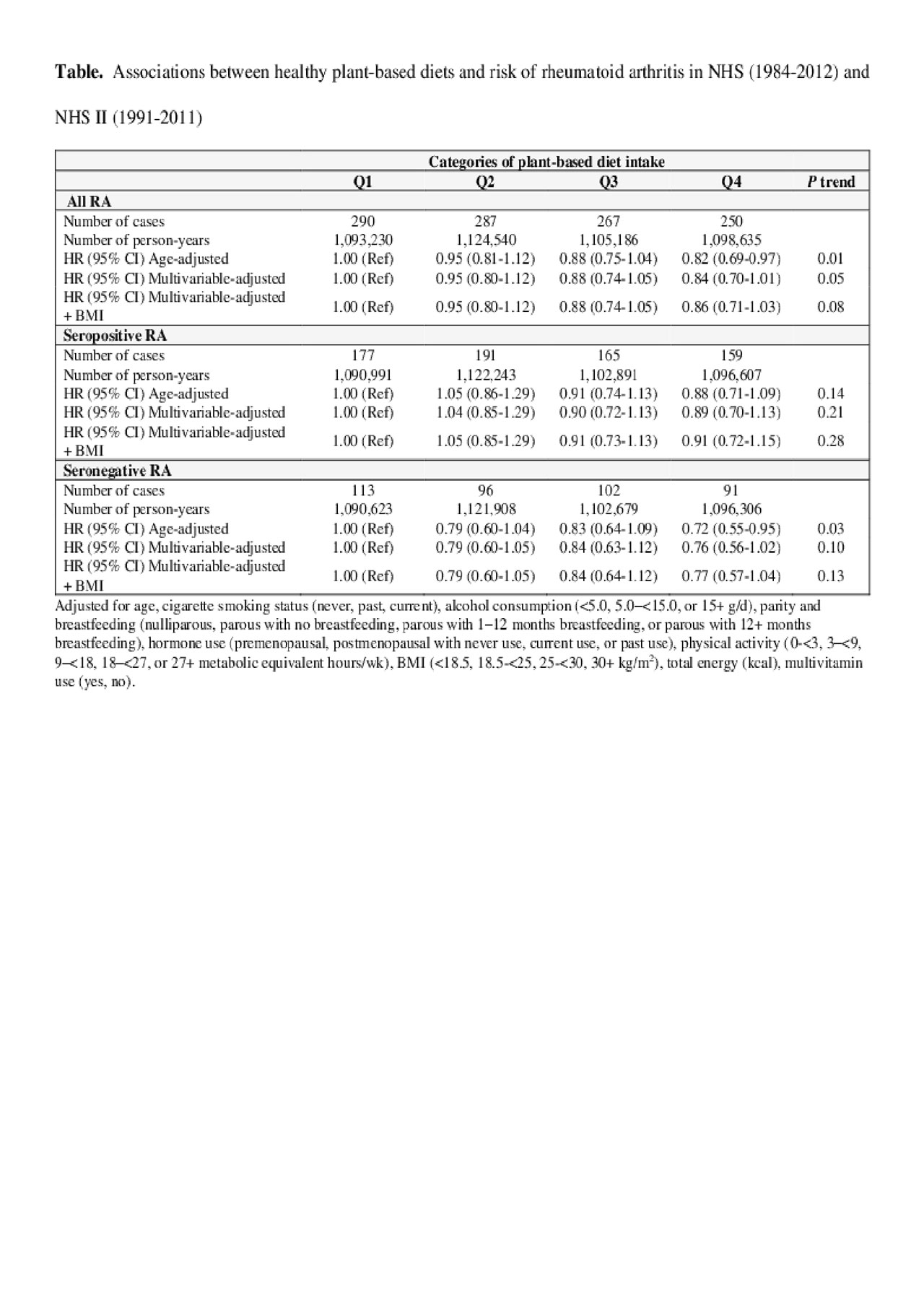Session Information
Session Type: Poster Session (Sunday)
Session Time: 9:00AM-11:00AM
Background/Purpose: Consuming an overall healthy diet has been associated with a reduced risk of developing rheumatoid arthritis (RA), but the impact of consuming a diet rich in healthy plant-based foods and low in unhealthy plant-based foods and animal foods has not been investigated previously. The aim of this study was to examine the association between a healthy plant-rich diet and RA in women.
Methods: We prospectively studied 79,465 women from the Nurses’ Health Study (NHS) (1984-2012) and 95,741 women from NHS II (1991-2011), who did not have RA at baseline. Information on health, diet, and lifestyle was collected biennially. A diet score was previously created to define a healthy plant-rich diet with higher intake in fruit, vegetable, whole grain, nut, legume, vegetable, coffee and tea consumption, lower intake in fruit juice, refined grain, potato, sugar-sweetened beverage, sweets and dessert consumption, and lower intake in animal foods (animal fats, dairy, eggs, fish, seafood, meat). Cox proportional hazards models, adjusted for age, smoking, physical activity, hormone use, multivitamin use, parity, and duration of breastfeeding, alcohol and total energy intake, were used to estimate hazard ratios (HR) and 95% confidence intervals (CI). Additional adjustment of BMI in separate models assessed the potential mediation effect. Because type of RA and diagnosis at earlier ages can be indicative of differences in disease prognosis, we further stratified our analyses by age at diagnosis and serostatus (seropositive and seronegative).
Results: Over 3,421,592 person years, 1,091 women developed RA in pooled analyses. In age-adjusted models, women with the highest adherence to a healthy plant-based diet had a decreased risk of RA (quartile 4 vs quartile 1 of dietary intake, HR = 0.82; 95% CI = 0.69-0.97, p trend = 0.01). In multivariable adjusted model, the association was attenuated (HR=0.84; 95% CI = 0.70-1.01, p trend=0.05). Additional adjustment for BMI attenuated the association to null. We did not observe significant associations of a healthy plant-based diet with seropositive and seronegative RA separately in multivariable adjusted models, and did not observe a significant difference among women with age ≤55 years and age >55 years.
Conclusion: Consuming a healthy plant-based diet, rich in whole grains, fruits, vegetables, and nuts, may be associated with a modest reduction in RA risk. BMI may mediate the association. Replication of these findings in other prospective studies are needed to confirm if increased consumption of a healthy plant-based diet leads to reduced risk of RA.
To cite this abstract in AMA style:
Marchand N, Bhupathiraju S, Baden M, Sparks J, Malspeis S, Costenbader K, Karlson E, Lu B. A Healthy Plant-Rich Diet and the Risk of Rheumatoid Arthritis in Women [abstract]. Arthritis Rheumatol. 2019; 71 (suppl 10). https://acrabstracts.org/abstract/a-healthy-plant-rich-diet-and-the-risk-of-rheumatoid-arthritis-in-women/. Accessed .« Back to 2019 ACR/ARP Annual Meeting
ACR Meeting Abstracts - https://acrabstracts.org/abstract/a-healthy-plant-rich-diet-and-the-risk-of-rheumatoid-arthritis-in-women/

